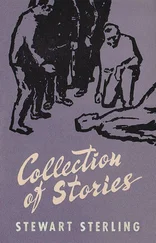“But you can’t help seeing who gets off each time you stop.”
This time No. 27 wouldn’t answer at all. The interview was over, as far as he was concerned. He flung down a nickel, defiantly jerked down the visor of his cap, and swaggered off.
Bliss slouched forlornly out of the terminal, worse off than before. The issue was all blurred now. The ticket-seller vaguely thought some girl or other had haphazardly bought a ticket for as much money as she had on her person that night, but without guaranteeing that she fitted his description of Smiles at all. The driver, on the other hand, definitely denied anyone like her had ridden with him, as far as Denby or anywhere else. What was he to think? Had she left, or hadn’t she left?
Whether she had or not, it was obvious that she had never arrived. He had the testimony of her own mother, and that letter from her from upstate, to vouch for that. And who was better to be believed than her own mother?
Had she stayed here in the city then? But she hadn’t done that, either. He knew Smiles so well. Even if she had gone to the length of staying overnight at a hotel that first night, Tuesday, she would have been back home with him by Wednesday morning at the very latest. Her peevishness would have evaporated long before then. Another thing, she wouldn’t have had enough money to stay for any longer than just one night at even a moderately priced hotel. She’d flung down the greater part of her household expense money on the floor that night before walking out.
“All I can do,” he thought apprehensively, “is make a round of the hotels and find out if anyone like her was at any of them Tuesday night, even if she’s not there now.”
He didn’t check every last hotel in town, but he checked all the ones she would have gone to, if she’d gone to one at all. She wouldn’t have been sappy enough to go to some rundown lodging-house near the freight yards or longshoremen’s hostelry down by the piers. That narrowed the field somewhat.
He checked on her triply: by name first, on the hotel registers for Tuesday night; then by her description, given to the desk clerks; and lastly by any and all entries in the registers, no matter what name was given. He knew her handwriting, even if she’d registered under an assumed name.
He drew a complete blank. No one who looked like her had come to any of the hotels — Tuesday night, or at any time since. No one giving her name. No one giving another name, who wrote like her. What was left? Where else could she have gone? Friends? She didn’t have any. Not close ones, not friends she knew well enough to walk in on unannounced and stay overnight with.
Where was she? She wasn’t in the city. She wasn’t in the country, up at Denby. She seemed to have vanished completely from the face of the earth.
It was past two in the morning by the time he’d finished checking the hotels. It was too late to get a bus any more that night, or he would have gone up to Denby then and there himself. He turned up his coat collar against the night mist and started disconsolately homeward. On the way he tried to buck himself up by saying: “Nothing’s happened to her. She’s just hiding out somewhere, trying to throw a scare into me. She’ll show up, she’s bound to.” It wouldn’t work, much. It was two whole days and three nights now. Marriage is learning to know another person, learning to know by heart what he or she’d do in such-and-such a situation. They’d only been married six weeks, but, after all, they’d been going together nearly a year before that; he knew her pretty well by now.
She wasn’t vindictive. She didn’t nurse grievances, even imaginary ones. There were only two possible things she would have done. She would have either gotten on that bus red-hot, been cooled off long before she got off it again, but stayed up there a couple of days as long as she was once there. Or if she hadn’t taken the bus, she would have been back by twelve at the latest right that same night, with an injured air and a remark like: “You ought to be ashamed of yourself letting your wife walk the streets like a vagrant!” or something to that effect. She hadn’t, so she must have gone up there. Then he thought of the letter from her mother, and he felt good and scared.
The phone was ringing when he got back. He could hear it even before he got the front door open. He nearly broke the door down in his hurry to get at it. For a minute he thought—
But it was only Mrs. Alden. She said, “I’ve been trying to get you ever since ten o’clock. I didn’t hear from you, and I’ve been getting more and more worried.” His heart went down under his shoelaces. “Did you locate her? Is it all right?”
“I can’t find her,” he said, so low he had to say it over again so she could catch it.
She’d been talking fast until now. Now she didn’t say anything at all for a couple of minutes; there was just an empty hum on the wire. Something came between them. They’d never seen each other face to face, but he could sense a change in her voice, a different sound to it the next time he heard it. It was as though she were drawing away from him. Not moving from where she stood, of course, but rather withdrawing her confidence. The beginnings of suspicion were lurking in it somewhere or other.
“Don’t you think it’s high time you got in touch with the police?” he heard her say. And then, so low that he could hardly get it: “If you don’t, I will.” Click, and she was gone.
He didn’t take it the way he, perhaps, should have.
As he hung up, he thought, “Yes, she’s right, I’ll have to. Nothing else left to be done now. It’s two full days now; no use kidding myself any more.”
He put on his hat and coat again, left the house once more. It was about three in the morning by this time. He hated to go to them. It seemed like writing finis to it. It seemed to make it so final, tragic, in a way. As though, once he notified them, all hope of her returning to him unharmed, of her own accord, was over. As though it stopped being just a little private, domestic matter any more and became a police matter, out of his own hands. Ridiculous, he knew, but that was the way he felt about it. But it had to be done. Just sitting worrying about her wasn’t going to bring her back.
He went in between two green door lamps and spoke to a desk sergeant. “I want to report my wife missing.” They sent a man out, a detective, to talk to him. Then he had to go down to the city morgue, to see if she was among the unidentified dead there, and that was the worst experience he’d had yet. It wasn’t the sight of the still faces one by one; it was the dread, each time, that the next one would be hers. Half under his breath, each time he shook his head and looked at someone who had once been loved, he added, “No, thank God.” She wasn’t there.
Although he hadn’t found her, all he could give when he left the place of the dead was a sigh of unutterable relief. She wasn’t among the found dead; that was all this respite marked. But he knew, although he tried to shut the grisly thought out, that there are many dead who are not found. Sometimes not right away, sometimes never.
They took him around to the hospitals then, to certain wards, and though this wasn’t quite so bad as the other place, it wasn’t much better either. He looked for her among amnesia victims, would-be suicides who had not yet recovered consciousness, persons with all the skin burned off their faces, mercifully swathed in gauze bandaging and tea leaves. They even made him look in the alcoholic wards, though he protested strenuously that she wouldn’t be there, and in the psychopathic wards.
The sigh of relief he gave when this tour was over was only less heartfelt than after leaving the morgue. She wasn’t dead. She wasn’t maimed or injured or out of her mind in any way. And still she wasn’t to be found.
Читать дальше












